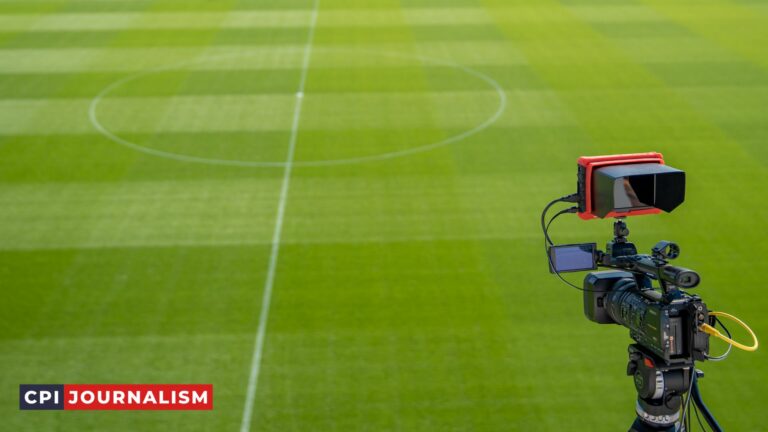What Are The Best Practices For Sports Journalists On Social Media?
Welcome, fellow journalists! As an experienced sports journalist, I’m here to share my knowledge and provide insight into the best practices for using social media as a sports journalist.
Social media is an invaluable tool for staying up-to-date on the latest news and trends in the world of sports, but it can also be a minefield if you don’t follow the right protocols.
In this article, I’ll be discussing the best practices for sports journalists on social media, from maintaining a professional presence to being mindful of the platform you are using. I hope that my advice will be useful to you in your journey as a sports journalist.
A. Increased Reach
As a sports journalist, one of the best practices for using social media is to increase your reach. This can be done through a variety of methods.
First, be sure to use relevant hashtags when posting your content. Hashtags will help your posts reach a broader audience, as search engines use hashtags to categorize content.
Additionally, use popular hashtags related to your content, as well as industry-specific hashtags. This will help attract people who are interested in the topics you’re covering.
Second, consider investing in sponsored posts. These can be used to target specific audiences and can help boost your content’s visibility. It’s also important to make sure that your sponsored posts are relevant to your content and audience.
Third, don’t be afraid to use visuals. Adding visuals to your posts can help draw in more eyes and create a more engaging post. This can be done through the use of photos, videos, and GIFs.
Finally, be sure to interact with your followers. Ask questions, start conversations, and reply to comments. This will show that you are engaged with your followers and will help you build relationships with them.
By following these simple strategies, you can increase your reach and ensure that more people are seeing your content.
B. Ability to Connect with Fans
One of the most important best practices for sports journalists on social media is to engage with their fans. Social media is an invaluable tool for sports journalists to communicate and connect with their audience, offering a personal touch to their work.
Successful sports journalists have the ability to make their readers feel as though they’re part of the story, from behind-the-scenes commentary to engaging questions and polls.
Journalists should always respond to their audience’s comments and questions. This not only builds trust, but also helps to build a stronger sense of community.
Additionally, journalists should encourage their followers to share their own thoughts and opinions on the topic at hand.
Finally, journalists should use social media to share exclusive content that cannot be found anywhere else. This could include exclusive interviews with athletes, team owners, and coaches, as well as unique insights and analysis..
By providing unique content, journalists are able to give their readers a more personal experience, and create an even stronger connection with their fans.
C. Opportunity to Engage with Other Journalists
Social media is a great way for sports journalists to connect with other journalists in the same field. This not only allows them to stay informed on the latest developments in the sports world, but also to share ideas and discuss best practices.
One of the best ways to do this is to join relevant industry groups on social media platforms such as LinkedIn. Many of these groups are open to journalists of all levels, and they can be a great place to ask questions and get advice from more experienced professionals.
In addition, Twitter is an excellent platform for journalists to engage in the conversation on relevant topics. This can include participating in chats, responding to questions, and joining in debates on current issues.
For journalists who are looking to gain exposure, creating a personal blog is also a great way to share their work. This can help them establish themselves as an expert in the sports world, and it can also provide an opportunity to engage with other journalists and readers.
Ultimately, engaging with other journalists on social media is a great way for sports journalists to learn from their peers and stay up to date with their industry.
By taking advantage of these opportunities, they can become better informed, more knowledgeable, and more successful in their careers.
II. Best Practices for Sports Journalists on Social Media
As a sports journalist, it is important to adhere to certain best practices when utilizing social media.

Here are some guidelines to ensure your social media presence is professional and effective:
• Be mindful of your followers: Social media is a powerful tool for connecting with fans and engaging with an audience, so it is important to remember that the content you post can have an impact on those who follow you.
Therefore, be mindful of the language you use, the topics you discuss, and the tone you take when interacting with them.
• Evaluate your sources: Before you post any information, be sure to evaluate the source. Ensure that the source is reliable and credible before sharing the information with your followers.
• Stay up-to-date: As a sports journalist, it is important to stay up-to-date with the latest news and developments in your field. Utilize social media to stay informed and to provide your followers with breaking news and updates.
• Be ethical: As a sports journalist, it is important to adhere to ethical standards. Avoid reporting rumors or speculation, and be sure to double-check the accuracy of any information before posting it.
• Engage with fans: Social media is an excellent platform for engaging with your followers. Take the time to respond to comments and questions, and be sure to thank your followers for their support.
• Connect with other journalists: Social media is a great way to connect with other sports journalists and to share ideas and insights. Take the time to network and collaborate with other journalists in order to stay informed and to stay ahead of the curve.
Following these best practices can help ensure that your social media presence is professional, effective, and enjoyable for your followers.
A. Establish a Professional Presence
Sports journalists have the unique opportunity to use social media to share their expertise and report on sporting events and news. However, it is important for them to establish a professional presence and adhere to best practices.
First and foremost, sports journalists should ensure that their profile and content are appropriate for their profession. This means avoiding personal content that is unrelated to sports journalism and using language that is respectful and professional.
Additionally, sports journalists should be mindful of the organizations and athletes they are associated with.
When posting about a team or athlete, it is important to do so in a respectful manner and to avoid personal attacks or inflammatory language. Additionally, journalists should ensure that their content adheres to the organization’s policies.
Sports journalists should also establish a presence on social media platforms that are most relevant to their content.
For example, if they are primarily focused on football, they should focus on platforms such as Twitter and Instagram, which are popular among football fans.
Finally, sports journalists should consider setting up a blog or website that is dedicated to their work. This will help them build an online presence and provide an additional platform for them to share their work.
By following these best practices, sports journalists can establish a professional presence on social media and use it to their advantage.
1. Use a Professional Profile Picture
As a sports journalist, your profile picture is a key element of your online identity. It’s the first thing people will see when they visit your social media profile and is a reflection of your professionalism and credibility.
When selecting a profile picture, it’s important to choose one that is appropriate and represents you as a professional.
Your profile picture should be of your face, not a logo or a cartoon. It should be a clear and professional headshot, not a snapshot taken of you while you were out with friends.
If possible, you should use a photo taken by a professional photographer. If you don’t have a professional photo, consider having one taken.
Your profile picture should be a current photo. It should be an accurate representation of what you look like now. Avoid using a photo that was taken many years ago or one that is heavily Photoshopped.
You should also avoid using a photo of yourself with friends or family as this can be confusing to people who are unfamiliar with you.
Finally, you should avoid using a photo that looks too casual or informal. For example, avoid wearing hats, sunglasses, or other accessories that may take away from the professional look of your profile picture.
By following these tips, you can ensure that your profile picture accurately reflects your professionalism and credibility as a sports journalist.
2. Create a Professional Bio
Creating a professional bio is essential for sports journalists who want to succeed on social media. Your bio should be a concise, yet comprehensive overview of your experience, skills, and expertise.
When crafting your bio, consider the following best practices:
• Introduce yourself: Begin your bio with your name and a brief description of your role. Make sure to include any titles or credentials that you possess.
• Highlight your expertise: Next, detail your experience and skills as a sports journalist. Include any relevant awards or recognition you’ve received in the industry, as well as any specialties you may have.
• Include your social media accounts: To ensure that users can easily find you on social media, include links to your Twitter, Instagram, Facebook, and other accounts.
• Keep it concise: Aim to keep your bio between 150-200 words. This will keep it concise and easy to read.
By following these best practices, sports journalists can create a professional bio that will help them stand out on social media.
A well-crafted bio can help attract the attention of potential followers and readers, and ultimately, help you succeed as a sports journalist.
3. Utilize Appropriate Language
For sports journalists, the language used in social media is particularly important. It’s essential to maintain a professional tone, be respectful to all parties involved, and ensure that the language used is appropriate for the platform.
When communicating on social media, it’s important to consider the audience and be mindful of the language being used. Sports journalists should always strive to be accurate, fair, and balanced in their reporting. This includes using language that is appropriate for the topic and the platform.
Sports journalists should also be aware of the potential for their posts to be misunderstood or misinterpreted. It’s important to consider the tone of a post before publishing it, as this can have a significant impact on how it is received by the audience.
In addition, sports journalists should be mindful of the potential for their posts to be taken out of context. Posts should be concise and well-structured to ensure that the intended message is clear. Posts should also be checked for any potential errors or inaccuracies before publishing.
Finally, it’s important to be aware of potential language triggers. Certain words and phrases can be off-putting or offensive to certain individuals or groups, and should be avoided where possible. Any posts that could be seen to be divisive or inflammatory should be avoided.
By following these best practices, sports journalists can ensure that their posts are professional, respectful, and appropriate for the platform. This will help to ensure that posts are well-received by the audience, and that the journalist’s message is communicated clearly and accurately.
B. Engage with Fans
Engaging with your fans is an essential part of being a successful sports journalist on social media.
It is important to remember that your fans are the ones who read your articles and follow your work, so engaging with them and responding to their comments is key to building a strong and loyal following.
When engaging with fans, it is important to remain professional and courteous. You should always be respectful of your readers’ opinions, even if they don’t agree with yours.
Respectful dialogue can help create a more positive atmosphere and encourage more discussion and engagement.
In addition to responding to comments, it is also important to reach out to your fans and ask them questions. This will show that you value their opinions and are interested in hearing what they have to say.
It can also be a great way to get feedback on your work and make sure that you are delivering content that your readers want to see.
Finally, it is important to remember that engaging with fans can also be a great way to build relationships with them.
By engaging with your readers, you can create a more personal connection and make them feel like they are part of your community.
This can help to foster a more loyal following and ensure that readers keep coming back to your work.
1. Respond to Comments
As a sports journalist on social media, it is important to be mindful of how you interact with comments, whether they are positive or negative.
Here are some of the best practices for responding to comments on social media:
1. Acknowledge Every Comment: Acknowledge every comment, whether positive or negative. Show your readers that you appreciate their interest and feedback. This will help build a positive rapport with your readers and will encourage them to engage with you more in the future.
2. Keep Your Responses Professional: It is important to keep your responses professional and courteous. Avoid getting into arguments or debates with readers, as this will only damage your reputation.
3. Never Delete Comments: Never delete comments, as this will only create a sense of distrust among your readers. If someone has posted a comment that you do not agree with or think is inappropriate, simply ignore it or respond politely.
4. Be Open to Constructive Criticism: Not all comments will be positive, and it is important to be open to constructive criticism. It is important to remember that criticism can be a great way to learn and improve.
5. Use Hashtags to Increase Engagement: Utilize hashtags to increase the reach of your posts and encourage more readers to engage with your content. This will help you to build an engaged audience and will help to generate more conversations around your posts.
By following these best practices, you will be able to create a positive, engaging environment for your readers on social media. This will help you to build your reputation as a trusted and respected sports journalist.
2. Share Interesting Content
One of the most important best practices for sports journalists on social media is to share interesting content.
Content should be timely and relevant to your audience, and should be tailored to the platform you are using.
For example, if you are using Twitter as your platform of choice, then you should focus on creating short, snappy and engaging tweets.
You can share news stories, links to articles, comment on live events, and even use humour to engage your followers.

On Instagram, you can share engaging photos of athletes, sports venues, or sports-related items. Use captions to add context and engage your followers.
On Facebook, you can post short stories, blog posts, and videos. You can also create polls and surveys to gather feedback from your followers.
Ultimately, the content you share should be of interest to your followers and should be tailored to the platform. Your content should be engaging and fun, and should encourage your followers to engage with your posts.
Sharing interesting content is a great way to build an engaged following and increase your influence as a sports journalist.
3. Ask Questions
As a sports journalist, one of the most important skills you can develop when using social media is the ability to ask meaningful questions.
Asking questions can be an effective way to engage with your audience, as well as to get the information you need to create compelling content.
When asking questions on social media, it is important to be specific and direct. Start with asking open-ended questions that will get your audience thinking and talking. This will help to create a dialogue and get the conversation going.
For example, you could ask your followers “What do you think are the biggest issues facing professional sports teams today?”.
You can also pose questions to individual users to get their opinion on a particular issue. This can be a great way to get insider information that could be used for your story. Be sure to respect the answers you receive, and be mindful of the user’s privacy.
Finally, don’t be afraid to ask questions that challenge the status quo. Asking questions that are controversial or thought-provoking can be a great way to engage your audience and get them talking.
By asking the right questions, you can gain valuable insights and create interesting content. Asking questions is an essential skill for any sports journalist looking to make an impact on social media.
4. Monitor Your Tone
As a sports journalist, it is important to remember that your tone on social media should be professional at all times.
It is important to be mindful of the language you use and the attitude you portray. You should always be respectful of other people and their opinions, even if you disagree with them.
When engaging with other people, you should be open-minded and willing to listen to different perspectives. You should also avoid using language that is inflammatory, derogatory, or disrespectful.
Another important aspect to monitor is your level of emotion. It is important to be passionate about the topics you are discussing, but it is also important to be mindful of how you express your opinion.
You should avoid getting aggressive or confrontational with other people, as this can have a negative impact on your reputation.
When discussing sensitive topics, it is important to be mindful of the language you use and to be respectful of other people’s views and opinions. You should also be aware of any potential biases that you may have and try to be as objective as possible.
Finally, you should also be aware of any potential legal implications of your posts. You should be mindful of any copyright laws or defamation laws that may be applicable in your jurisdiction.
It is also important to be aware of any potential conflicts of interest that may arise from your posts. By monitoring your tone, you can ensure that you are engaging with people in a respectful and professional manner and that you are adhering to the applicable laws and regulations.
C. Monitor Your Content
As a sports journalist on social media, it is important to be aware of your content and how it is being received. Monitoring your content can help you understand what resonates with your audience, what you should be focusing on, and how to better interact with your followers.
To monitor your content, you should check your post analytics regularly. This will show you how many people are seeing your content, how much engagement it is receiving, and which posts are the most successful.
Additionally, you should also pay attention to the comments and feedback you are receiving. Don’t be afraid to ask your followers questions and start conversations. This will give you an insight into what your followers are interested in and what topics you should focus on in your content.
You should also set up Google Alerts for topics or keywords related to your content. This will allow you to stay up to date on the latest news and events in the sports world. Additionally, you should also consider setting up a social media listening tool.
This will enable you to keep track of conversations around certain topics and help you understand what people are talking about.
By monitoring your content, you will be able to better understand your followers and create content that resonates with them. This will help you build a successful and engaged following, and establish yourself as a trusted source of information.
1. Avoid Controversial Topics
As a sports journalist on social media, one of the best practices you can adhere to is to avoid controversial topics. Controversial topics can be divisive and can quickly lead to a divisive discourse.
Even if the topic may be relevant to the sport, it is important to remember that the primary goal of sports journalism is to inform and entertain the public. By engaging in controversial topics, you risk alienating and offending readers, which could lead to a decrease in readership.
It is also important to remember that you are representing a publication or network when engaging on social media.
This means that it is important to adhere to the standards and values of the organization. If your organization does not engage in controversial topics, it is important to respect their wishes.
Finally, it is important to remember that social media is a public platform. Even if you have the best of intentions when engaging in controversial topics, you may be misunderstood.
It is important to think carefully about the potential repercussions of engaging in controversial topics before making any posts.
2. Avoid Posting Unverified Information
As a sports journalist, it is important to remember that you are a professional and your work will be held to high standards.
Posting unverified information on social media is not only unprofessional, it can be dangerous. You must always ensure that any information you post is accurate and verified.
It is important to double-check your facts and sources before you post anything. If possible, you should also get a second opinion from another journalist or expert on the topic.
This will ensure that the information you are posting is accurate and reliable.
It is also important to be aware of bias and personal opinions. You should avoid making sweeping statements or opinions that are not based on facts. As a journalist, it is your responsibility to provide impartial, unbiased reporting.
Finally, avoid posting any speculative information or making assumptions about a situation. This can lead to inaccurate reporting and can create a false narrative. Instead, focus on reporting the facts and providing an objective analysis of the situation.
3. Avoid Posting Personal Opinions
As a sports journalist, it is important to remember that social media is a professional platform and should be used as such. As tempting as it may be to share your personal opinions about the latest sports news, it is best to avoid doing so.
Your opinions can be misconstrued and could lead to a conflict of interest. Even if you are sharing your opinion on a team or athlete, it is important to ensure that you are not compromising your integrity as a journalist.
Your role as a sports journalist is to report the news and to provide objective, unbiased information to your readers.
You should strive to maintain your professionalism and refrain from sharing personal opinions. Doing so can damage your credibility and integrity as a journalist.
It is also important to remember that when you post something on social media, it can be seen by anyone, regardless of whether they are your followers or not.
This means that potential employers, editors, or other journalists may see your post and may not agree with your opinion.
By avoiding posting personal opinions, you can remain professional and maintain your credibility as a sports journalist.
4. Double-Check Sources
As a sports journalist, it is important to always double-check your sources. This means verifying the accuracy and credibility of any information you use in your writing or post on social media.
To do this, you should always look for primary sources, such as interviews with athletes and coaches, as well as any official documents or reports related to the topic.
It is also important to double-check any secondary sources, such as press releases, news articles, and blog posts.
Make sure that the information is fact-checked and reliable by reading multiple sources and cross-referencing the information. This will help you ensure that the information you post or use in your writing is accurate and up-to-date.
If you are unsure about a source’s credibility, you should avoid using it altogether. It is better to take the time to find a reliable source than to risk posting inaccurate or misleading information.
Furthermore, it is always a good idea to provide a link to the source you used in your post or article so that readers can double-check it for themselves.
III. Conclusion
In conclusion, it’s important for sports journalists on social media to be aware of the potential impact their words can have on their audience, their industry, and the teams and athletes they cover.
Utilizing best practices, such as writing fact-based content, understanding the importance of accuracy and objectivity, and refraining from engaging in personal attacks, can help journalists to maintain their professionalism and credibility.
Additionally, developing relationships with teams, athletes, and other sports media professionals can provide journalists with additional access and resources.
By taking the time to understand the best practices for sports journalists on social media, journalists can ensure they are delivering the highest quality content to their readers and viewers.
A. Summary of Best Practices
1. Respect the Rules of Engagement: As a sports journalist, it is important to understand the rules of engagement for each social media platform.
Each platform has different rules for how to participate, and it is important to adhere to those rules in order to get the most out of your social media presence.
2. Be Professional: It is important to maintain a professional tone on social media channels. Remember that you are representing yourself and your organization, and it is important to be mindful of that when engaging with other users.
3. Be Open and Engaging: Social media is a great way to engage with your readers and build relationships. Take the time to respond to user comments and messages, and be open to engaging in conversations about sports topics.
4. Avoid Controversial Topics: As a sports journalist, it is important to avoid controversial topics that may be seen as biased or inappropriate. Stay focused on providing factual, unbiased information and avoid personal opinion.
5. Monitor Your Content: Always take the time to review your posts before publishing. Make sure that you are providing accurate information, and double check spelling and grammar to make sure that you are presenting yourself in a professional manner.
6. Stay Up-to-Date: Social media is a great way to stay up to date with the latest news and trends in the sports world. Make sure to follow other sports journalists, teams, leagues, and organizations to stay on top of the latest news.
B. Benefits of Social Media for Sports Journalists
Social media has become an invaluable tool for sports journalists in the 21st century. This powerful platform provides sports journalists with a host of advantages that can help them produce more accurate and timely content.
One of the primary benefits of social media for sports journalists is the ability to quickly and easily access information. Through social media, sports journalists can connect with sources, experts, and players to get the latest information about games and events.
This can help journalists produce more accurate and timely content.
In addition, social media also provides sports journalists with the opportunity to engage in conversations with fans and viewers.
Through this platform, sports journalists can get direct feedback from their readers and viewers on the quality and accuracy of their stories. This can help them to better shape and craft their stories to appeal to their audience.
Finally, sports journalists can also use social media to promote their content and increase their reach. Through social media, sports journalists can easily share their content with a wider audience, helping them to reach more people and get more exposure.
Overall, social media provides sports journalists with a number of benefits that can help them produce better content and reach a larger audience. With the right approach, sports journalists can make the most of this powerful platform and reach their goals.
C. Tips for Staying Up-to-Date with the Latest News and Trends
As a sports journalist, staying up-to-date with the latest news and trends is essential in order to provide your readers with the most up-to-date information.
Here are some tips to help you stay current in the sports world:
1. Follow professional sports teams and athletes on social media platforms: Professional sports teams, athletes, and sports organizations are a great source of news and insight into the sports world.
Following them on Twitter, Instagram, and other social media outlets can be a great way to stay in the loop with the latest news, updates, and trends.
2. Sign up for sports newsletters: Subscribing to sports newsletters is a great way to stay up-to-date with the latest news, updates, and trends. Many sports organizations, teams, and professional athletes offer newsletters that contain exclusive content and updates.
3. Participate in discussion forums and online communities: Participating in discussion forums and online communities dedicated to sports is a great way to engage with other sports fans and stay current with the latest news and trends.
4. Follow news outlets that focus on sports: Following news outlets that focus on sports is a great way to stay on top of the latest news and trends. These outlets often provide up-to-date coverage of the sports world and can be a great source of information for sports journalists.
5. Use hashtag tracking: Hashtag tracking is an effective way to stay up-to-date with the latest news and trends related to sports. By tracking relevant hashtags, you can quickly get a sense of what is trending in the sports world.
By following these tips, you can ensure that you are staying up-to-date with the latest news and trends in the sports world. This will help you provide your readers with the most current and relevant information.







